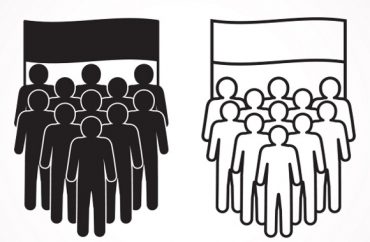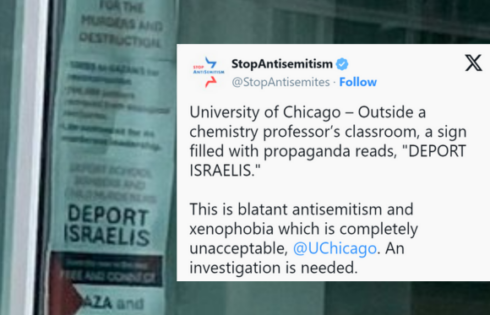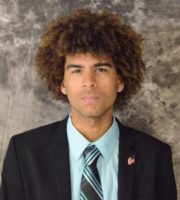
Students must ‘feel safe and supported’ to express their true views
University at Buffalo students who are stressed by election results – or lack thereof – can find solace through university-promoted racial segregation.
The public university, part of the State University of New York system, is hosting two different listening sessions via Zoom on Wednesday: one for whites and one for nonwhites. The hourlong events are sponsored by UB Counseling Services.
“Stressed about the election and election results?” the Student Life website asks. “Talking to someone–or just listening–can help lower your anxiety.”
The College Fix asked UB if a person of color could attend the white session. A counseling staffer did not answer, but instead highlighted future listening sessions open to “all racial groups.”
UB posted a statement in the early afternoon in response to a Fix query, but the statement still does not directly answer whether a person of color could attend a white session.
MORE: Study claims Dems ‘over-reported’ mental stress following 2016 election
The segregated virtual spaces are intended to help students “peacefully express their views and opinions in an environment where they feel safe and supported,” the statement reads. It’s attributed to Sharon Mitchell, senior director of student wellness and director of counseling services.
“It would be nice if everyone was included together for any meetings so as to not foster (even if unintended) division,” a humanities professor told The Fix in an email.
“It also seems to lump all persons of color together even though this overall is a very diverse group,” the UB professor continued, requesting anonymity because of the precariousness of being untenured. “The interests of some people of color are different than others (ie- African-Americans, Latinos, Asians, Native Americans).”
UB is not the only public university offering to segregate students by race as a coping mechanism in the aftermath of Election Day. Last night the University of Washington School of Medicine advertised three “Race Based Caucuses” scheduled for Wednesday afternoon, for black, white and other races.
The School of Medicine and UW media relations have not answered late morning questions from The Fix about whether the caucuses exclude people based on their race – if whites can attend the other two groups and vice versa.
Interracial conversations allowed next week
Each listing for the UB listening sessions has the same description. Only the titles make clear which races each is for.
“The upcoming presidential election is an important part of the lives of everyone living in the United States today,” the description says:
Mental Health [sic] experts have found that people are feeling especially stressed by this year’s election. This stress may be compounded by the COVID-19 pandemic, economic pressures as well as racialized violence. Increasing coping and support can include talking to others about your feelings.
Each session “provide[s] an opportunity for students to share how they have been emotionally and psychologically impacted by the upcoming election,” and will include ways to “identify peaceful action, inclusivity, coping and support.”
The description does not explain how sessions segregated by race promote “inclusivity.”
The segregated sessions have already been held once, on Oct. 26, but curiously the university changed the order and format of the Web addresses for the sessions scheduled for Wednesday.
MORE: Universities help students cope with Election Day stress
The “White Affinity Group” URL for last week shows it was listed first (“1”). The “People of Color Affinity Group” URL for that same day shows it was listed second (“2”). Wednesday’s white group is numbered “3,” and the POC group is not numbered at all (“people-of-color-affinity-group”). The POC group gets top billing on the current page.
A secretary in UB Counseling Services told The Fix in a phone call that she “wasn’t sure” if white and nonwhite students could attend each other’s session, but promised a more detailed response from another staffer.
 Office Assistant Patrice Mack responded to The Fix in an email that appears to have copied and pasted its body from another source (left). It noted the Wednesday sessions are segregated between white and people of color. The final sentence is highlighted: “Sessions from 11 a.m. to noon on Nov. 11 and from 9-10 a.m. on Nov. 20 are open to all racial groups.”
Office Assistant Patrice Mack responded to The Fix in an email that appears to have copied and pasted its body from another source (left). It noted the Wednesday sessions are segregated between white and people of color. The final sentence is highlighted: “Sessions from 11 a.m. to noon on Nov. 11 and from 9-10 a.m. on Nov. 20 are open to all racial groups.”
Asked to clarify whether a person of color could attend the white affinity group, Mack did not respond.
The administration’s afternoon statement wraps the segregated sessions in the flag of free speech.
Because “all members of the campus community have a right” to be supported in their free speech, the university decided to create “spaces for students to connect with others who may share aspects of their identity,” Mitchell wrote:
As such, the university is offering affinity group discussions, as well as group listening sessions that are open to all racial groups, to reflect on the election. Affinity groups can allow for increased vulnerability and honesty among students who vary in what spaces feel safe to them. All of these discussions are intended to provide an environment for sharing and support. They are not a form of mental health treatment.
MORE: Study says 25% of millennials got PTSD from Trump election
The Black Student Union, Asian Student Union and Student Government Association did not answer requests for comment on the segregated sessions by Tuesday afternoon.
The president of UB’s Young Americans for Freedom chapter said that she was “disturbed” to see the school segregating students based on race.
“I believe open dialogue about issues–no matter how controversial–is important, and that unity is not achieved by dividing students by race,” Therese Purcell wrote in an Instagram message.
“We should be able to freely discuss ideas and issues together,” she continued: “Separating event attendance by race only adds to division. College should be a place where students of all races and beliefs can have meaningful discussion on real issues by coming together.”
The Young America’s Foundation, which oversees the Young Americans for Freedom chapters, noted Tuesday that UB joins the University of Kentucky and University of California-Davis in recently holding discussions or trainings that separate white from nonwhite students.
‘This will all turn to formally recognized celebration’ if you-know-who wins
A UW School of Medicine employee forwarded The Fix the Monday evening email from the school, titled “UW Medicine Well-Being and Support.” It’s signed by Anne Browning, assistant dean for well-being, and Patricia Kritek, associate dean for faculty affairs.
Most of the message does not make distinctions based on protected traits such as race. The school offers virtual community spaces for “uncertainty, stress and anxiety” Thursday and Friday, and a masked, physically distanced Friday “mindful walk” with colleagues.
“Guided meditation” sessions are offered daily through Friday, and Browning recommends watching “livecams of your favorite animals from the National Parks Service.”
But the first programming mentioned in the email are the Race Based Caucuses, offered by the Office of Healthcare Equity. They are also the first non-recurring scheduled events this week.
Each session – the Black Affinity Group, POC Affinity Group and White Affinity Group – will run from 1:30-3 p.m. The links to each simply open a Zoom conference, with no details on whether people can attend sessions outside their own race.
UW Medicine’s leadership is “gently leading all of us into a panicked and mournful state,” the employee who alerted The Fix wrote in an email. “Just what are overly sheltered teens and 20 somethings expected to do in all of this, but moo and panic as directed?”
Yet “if the ‘right’ candidate wins, this will all turn to formally recognized celebration,” the employee concluded.
MORE: Penn offers puppy cuddling, coloring, chocolate to cope with Trump win
IMAGE: Shutterstock
Like The College Fix on Facebook / Follow us on Twitter






Please join the conversation about our stories on Facebook, Twitter, Instagram, Reddit, MeWe, Rumble, Gab, Minds and Gettr.